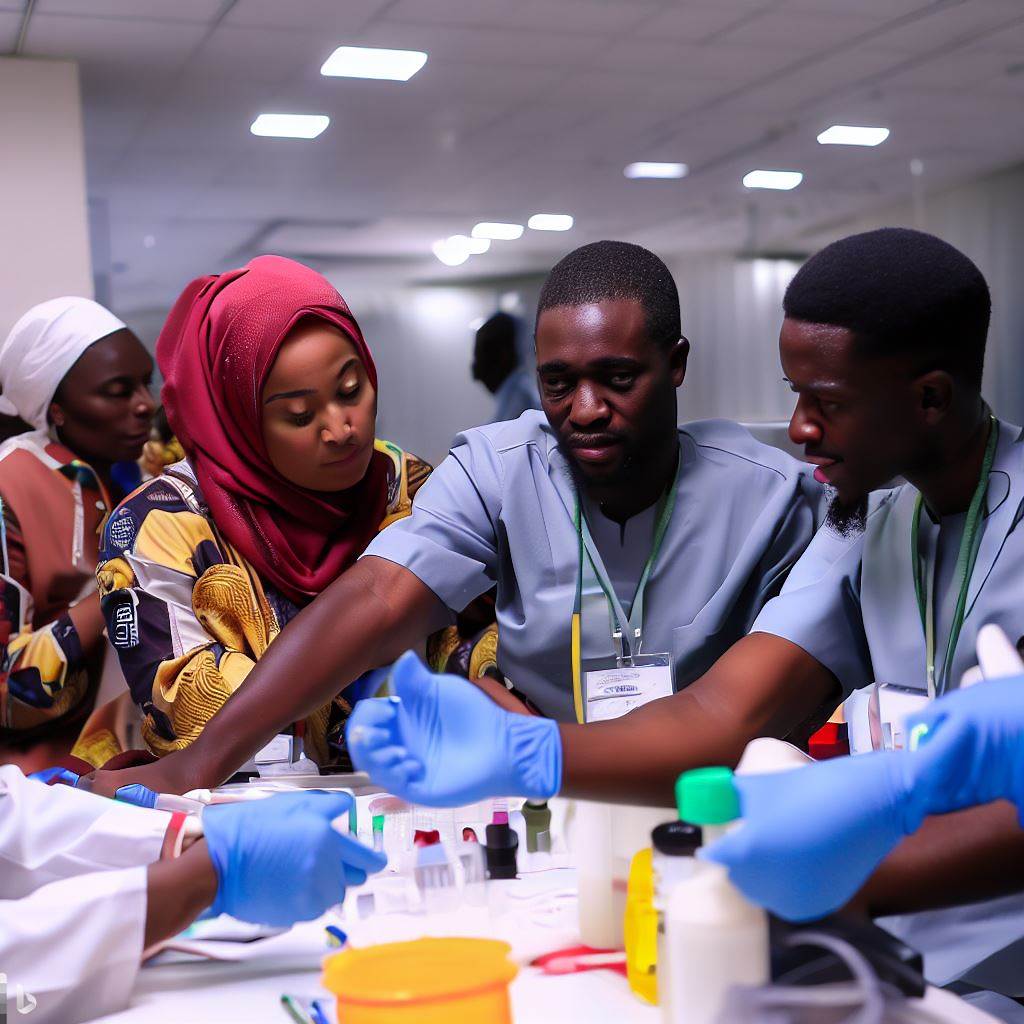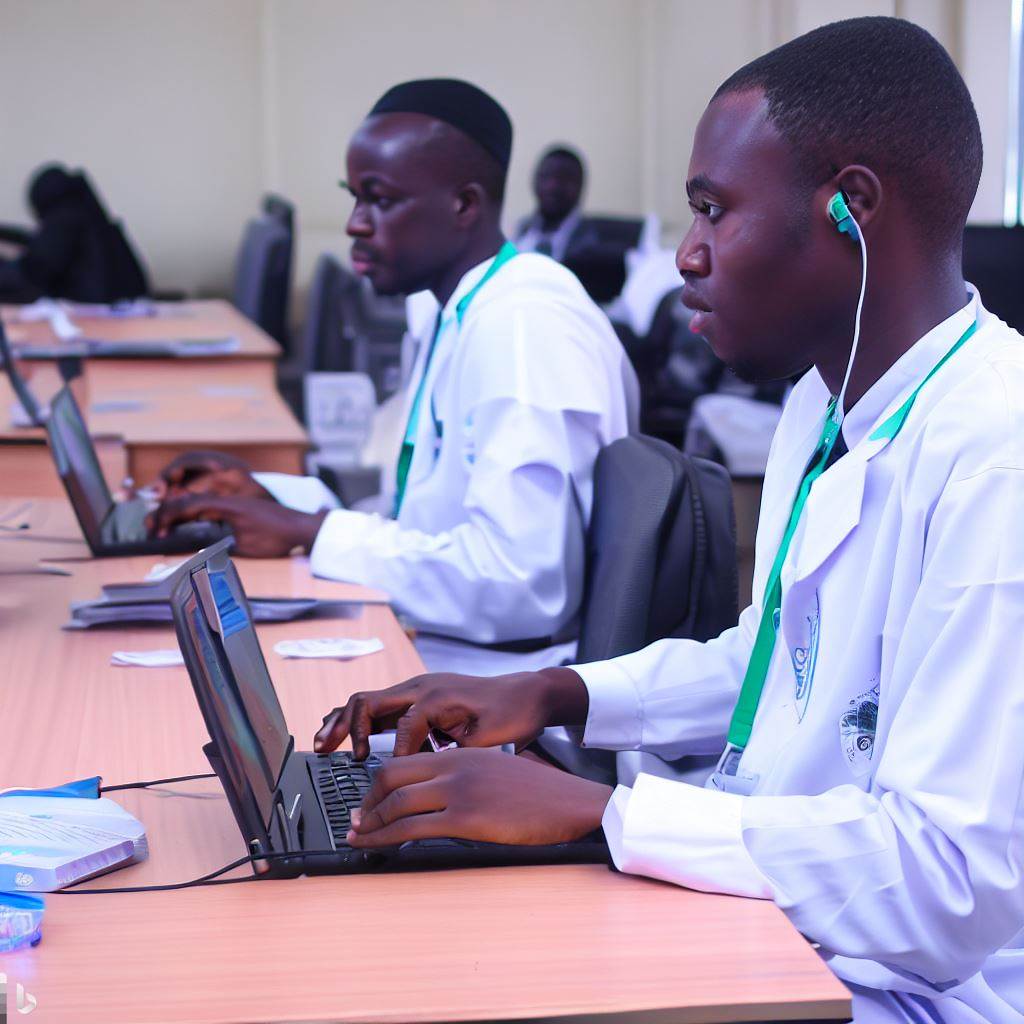Introduction
Phlebotomy is the practice of drawing blood from patients for diagnostic purposes. The Phlebotomy practices are crucial for accurate diagnosis and treatment planning.
Phlebotomy is the art of drawing blood from patients for diagnostic and therapeutic purposes.
Accurate phlebotomy practices are crucial for precise medical diagnoses and patient care.
This blog post delves into a comparative study of phlebotomy practices in Nigeria, uncovering similarities and differences.
Phlebotomy involves intricate procedures for blood collection, making it essential in healthcare:
- Diagnostic Insight: Blood samples aid in diagnosing diseases, assessing health, and monitoring treatment progress.
- Therapeutic Benefits: Therapeutic phlebotomy helps manage conditions like hemochromatosis and polycythemia.
The study examines Nigeria’s phlebotomy practices, comparing them with global standards:
- Training and Education: Exploring phlebotomy training programs, curriculum, and certification in Nigeria.
- Procedural Techniques: Analyzing the methods used for blood collection, handling, and patient comfort.
- Safety Protocols: Comparing infection control and safety measures, including the use of sterile equipment.
- Patient Experience: Assessing patient satisfaction and comfort during phlebotomy procedures.
By understanding Nigeria’s phlebotomy practices within a global context, we gain insights into potential areas of improvement.
The comparative study aims to foster knowledge exchange, enhance best practices, and contribute to elevating phlebotomy standards in Nigeria’s healthcare system.
Background of Nigeria’s healthcare system
Overview of Nigeria’s healthcare system
Nigeria’s healthcare system consists of a mix of public and private healthcare providers. Public healthcare facilities are operated by the government and funded through taxes and public funds.
Private healthcare facilities are privately owned and funded by individuals, corporations, or health insurance schemes. The healthcare system is divided into primary, secondary, and tertiary levels of care.
Primary healthcare is the first point of contact for individuals and is provided through community health centers and health posts.
Secondary healthcare is provided through general hospitals and specialized clinics. Tertiary healthcare is provided through teaching hospitals and specialized medical centers.
Challenges faced in the healthcare system
- Limited funding: Nigeria’s healthcare system faces inadequate funding from the government, which affects service delivery and infrastructure.
- Inadequate staffing: There is a shortage of healthcare professionals, particularly in rural areas, leading to a high patient-to-doctor ratio.
- Poor infrastructure: Many healthcare facilities lack basic amenities such as electricity, water supply, and proper sanitation.
- Inadequate equipment and supplies: Healthcare facilities often lack essential medical equipment and supplies, hindering effective diagnosis and treatment.
- Lack of access to healthcare: The geographical distribution of healthcare facilities in Nigeria is uneven, with rural areas having limited access to quality healthcare.
- Weak health information system: Nigeria lacks a robust health information system, resulting in gaps in data collection, analysis, and monitoring of health outcomes.
- Inadequate health insurance coverage: Many Nigerians do not have health insurance, making it difficult for them to afford healthcare services.
Despite these challenges, Nigeria’s healthcare system has made some progress in recent years.
The government has introduced various policies and initiatives to improve healthcare infrastructure, increase healthcare funding, and attract more healthcare professionals to the country.
However, there is still a long way to go in addressing the systemic issues and ensuring access to quality healthcare for all Nigerians.
Read: Regulatory Bodies for Pharmacy Technicians in Nigeria
Importance of phlebotomy practices in Nigeria
Role of phlebotomists in healthcare
Phlebotomists play a crucial role in healthcare by collecting blood specimens for laboratory testing. Their expertise ensures accurate and efficient collection of blood samples from patients.
They work closely with other healthcare professionals to obtain essential diagnostic information for patient care.
Phlebotomy is a critical step in the diagnostic process, as it helps identify diseases and monitor treatment progress.
Impact of quality phlebotomy practices on patient care
Quality phlebotomy practices are essential for patient safety and positive treatment outcomes. Improper techniques can lead to various complications, such as hematoma formation or inaccurate test results.
Well-trained phlebotomists minimize these risks by using proper sterile techniques and ensuring patient comfort.
Accurate blood collection enhances the reliability of laboratory test results, aiding in the diagnosis and management of diseases.
Comparison of phlebotomy practices between developed countries and Nigeria
In developed countries, phlebotomy is often performed by highly trained professionals, such as certified phlebotomists or nurses.
These professionals receive extensive education and follow strict standard operating procedures.
Strict regulations and quality control measures are in place to ensure the safety and accuracy of blood collection.
On the other hand, Nigeria faces challenges in maintaining consistent and standardized phlebotomy practices.
Due to limited resources and inadequate training programs, many healthcare facilities in Nigeria rely on non-specialized staff for phlebotomy.
This lack of expertise and standardized protocols increase the risk of errors and compromise patient care.
Efforts should be made to improve training programs, establish quality assurance measures, and enhance the role of phlebotomists in Nigeria’s healthcare system.
Overall, phlebotomy practices play a vital role in Nigeria’s healthcare system. Phlebotomists contribute to accurate diagnosis, effective treatment, and improved patient outcomes.
Quality phlebotomy practices ensure patient safety, minimize complications, and provide reliable test results.
Although challenges exist, addressing the gaps in Nigeria’s phlebotomy practices is crucial for enhancing healthcare delivery.
Read: Balancing Work and Life as a Phlebotomist in Nigeria
Current phlebotomy practices in Nigeria
In Nigeria, phlebotomy practices include training and certification requirements, equipment and supplies used, and standard operating procedures.
Phlebotomists adhere to aseptic techniques to prevent infection and contamination. Proper identification of patients and labeling of specimens are emphasized to avoid sample mix-ups.
Training and certification requirements
Phlebotomists in Nigeria undergo specific training programs to acquire the necessary skills and knowledge. Certification is an important requirement for practicing phlebotomy in Nigeria.
The Nigerian government has established regulations and standards for phlebotomy training and certification.
Phlebotomy practices in Nigeria are essential for accurate diagnosis and effective patient care.
The implementation of training and certification requirements ensures that phlebotomists possess the necessary skills and knowledge to perform their duties competently.
Training programs vary in duration and cover topics such as anatomy and physiology, venipuncture techniques, safety protocols, and medical ethics.
These programs aim to equip phlebotomists with the knowledge to handle different patient populations and challenging situations professionally.
Certification serves as a validation of a phlebotomist’s competence and adherence to national standards.
It gives patients confidence in the phlebotomist’s abilities and guarantees a higher level of quality in blood specimen collection and handling.
Equipment and supplies used
Phlebotomy in Nigeria requires the use of sterile collection tubes, needles, and disposal containers.
Phlebotomists also use tourniquets, alcohol swabs, and adhesive bandages during the blood collection process.
Quality control measures are in place to ensure the accuracy and reliability of equipment and supplies used.
Phlebotomists in Nigeria rely on a range of specialized equipment and supplies to perform their duties.
Sterile collection tubes ensure the integrity of blood samples, preventing contamination and inaccurate test results. The use of disposal containers enhances safety, proper waste management, and infection control.
Phlebotomists also utilize various ancillary supplies such as tourniquets, alcohol swabs, and adhesive bandages.
These items are essential for patient comfort, ensuring a smooth blood collection process. Each item used undergoes stringent quality control measures to maintain accuracy and promote patient safety.
Standard operating procedures
In Nigeria, specific guidelines and protocols are followed during the phlebotomy process to maintain patient safety and sample integrity.
Standard operating procedures guide phlebotomists in Nigeria to maintain uniformity and consistency in their practices.
These procedures encompass aseptic techniques, which include disinfecting the site of venipuncture and wearing gloves to prevent the spread of infections.
Furthermore, proper identification of patients before blood collection is crucial to avoid patient mix-ups, ensuring accurate test results and preventing potential harm.
Labeling of specimens at the collection site further minimizes the risk of errors during transportation and processing.
In fact, current phlebotomy practices in Nigeria emphasize the importance of training and certification, the use of specialized equipment and supplies, and adherence to standard operating procedures.
These practices are crucial for accurate diagnosis, effective patient care, and maintaining the integrity of blood samples.
Read: Covid-19 and Its Effect on Phlebotomy in Nigeria
Comparative study on Nigeria’s phlebotomy practices
Methodology of the Study
The study employed an active research approach, gathering data from skilled phlebotomists in local healthcare facilities through structured interviews.
Current phlebotomy guidelines were analyzed to understand the existing practices.
Selection of Countries for Comparison
Kenya and India were chosen for comparison due to similar healthcare challenges as Nigeria, but with different phlebotomy training methods. Cultural factors influencing practices were also considered.
Data Collection and Analysis
Data collection involved various sources, including questionnaires, interviews, and phlebotomy protocols.
The gathered information was analyzed to compare training programs, resources, and patient satisfaction surveys.
Findings of the Study
The study revealed that Nigeria’s phlebotomy training lacks standardization, while Kenya emphasizes practical hands-on training and India incorporates modern technology in practices.
All countries face challenges related to patient anxiety, and cultural beliefs influence blood collection methods.
In a nutshell, the study highlights the importance of adopting a standardized and hands-on approach to phlebotomy training in Nigeria.
Learning from Kenya’s practical training and India’s technological integration can enhance Nigeria’s practices.
Addressing cultural factors will improve patient experience and overall blood collection efficiency, contributing to advancements in Nigeria’s healthcare system.
The findings provide valuable insights for further research and improvements in phlebotomy practices in the country.
All in all, this section focuses on conducting a comparative study on Nigeria’s phlebotomy practices.
The methodology of the study, selection of countries for comparison, data collection and analysis, as well as the findings of the study are all presented.
Through this comparative study, valuable insights can be gained regarding Nigeria’s phlebotomy practices and potential areas for improvement.
Read: Career Progression in Optometry: A Nigerian Perspective

Challenges faced in improving phlebotomy practices in Nigeria
Lack of infrastructure and resources
- Inadequate facilities and equipment hinder efficient phlebotomy procedures.
- Shortage of funding limits the establishment and maintenance of necessary infrastructure.
- Limited access to essential supplies, such as needles and collection tubes, affects phlebotomy practices.
Limited awareness and education on phlebotomy
- Poor understanding and knowledge of phlebotomy techniques among healthcare professionals.
- Inadequate training programs that fail to cover the latest advancements in phlebotomy practices.
- Lack of standardized guidelines and protocols for phlebotomy training and certification.
Cultural and social barriers
- Traditional beliefs and superstitions discourage people from participating in phlebotomy procedures.
- Misconceptions about the purpose and benefits of blood collection hinder acceptance and cooperation.
- Mistrust in healthcare systems due to previous negative experiences impacts phlebotomy practices.
Governmental and regulatory support
- Inconsistent policies and regulations regarding phlebotomy practices lead to ambiguity and confusion.
- Lack of specific legislation addressing the quality and safety of phlebotomy procedures.
- Inadequate enforcement of existing regulations and limited accountability for non-compliance.
Most importantly, improving phlebotomy practices in Nigeria faces various challenges that must be addressed to ensure safe and efficient blood collection procedures.
The lack of infrastructure and resources, limited awareness and education, cultural and social barriers, as well as inadequate governmental and regulatory support, all contribute to the difficulties faced in advancing phlebotomy practices in the country.
Read: Top Institutions to Study Phlebotomy in Nigeria
Recommendations for enhancing phlebotomy practices in Nigeria
Enhancing phlebotomy practices in Nigeria is crucial for ensuring patient safety, improving healthcare outcomes, and building a robust healthcare system.
The following recommendations aim to address the existing challenges and improve phlebotomy practices in the country.
Strengthening training and certification programs
One of the key areas that require attention is the training and certification of phlebotomists in Nigeria.
Current training programs should be evaluated and strengthened to ensure they meet international standards.
Additionally, efforts should be made to make these training programs more accessible to aspiring phlebotomists across the country.
By investing in the development of comprehensive training programs, Nigeria can produce highly skilled and competent phlebotomists who adhere to the highest standards of safety and accuracy in blood collection.
Improving availability and maintenance of equipment
Adequate availability and proper maintenance of phlebotomy equipment is essential for achieving accurate and safe blood collection procedures.
Healthcare facilities in Nigeria should be equipped with modern and reliable instruments such as needles, collection tubes, and centrifuges.
Furthermore, regular maintenance and calibration of equipment should be prioritized to ensure their functionality and accuracy.
Healthcare facilities must allocate adequate funding to acquire and upkeep phlebotomy equipment, particularly in underserved areas.
Raising awareness and educating healthcare professionals
Continuous education and awareness campaigns targeting healthcare professionals can significantly enhance phlebotomy practices in Nigeria.
Publish Your Professional Profile, Business or Brand
Showcase your expertise, gain trust, and boost visibility instantly on Professions.ng.
Publish NowEducational workshops, seminars, and conferences should be organized to update healthcare professionals with the latest techniques and guidelines in phlebotomy.
Healthcare professionals must understand the significance of adhering to standard protocols and ensuring cleanliness during blood collection.
By improving knowledge and awareness, the overall quality of phlebotomy services can be elevated.
Collaborating with international organizations for support
Nigerian authorities should actively seek collaborations with international organizations specializing in phlebotomy and healthcare improvement.
These partnerships can provide technical support, training resources, and funding opportunities to enhance phlebotomy practices in the country.
By leveraging international expertise and resources, Nigeria can accelerate the implementation of best practices and ensure sustainable improvements in phlebotomy services nationwide.
Establishing regulatory standards and guidelines
To ensure uniformity and adherence to best practices, Nigeria should establish regulatory standards and guidelines governing phlebotomy practices.
These standards should cover aspects such as infection control, patient privacy, specimen labeling, and disposal of hazardous materials.
Regulatory bodies should be tasked with monitoring and enforcing compliance with these standards and guidelines.
Regular assessments and audits should be conducted to identify gaps and areas for improvement.
Basically, enhancing phlebotomy practices in Nigeria requires a comprehensive approach that focuses on strengthening training programs, ensuring equipment availability and maintenance, raising awareness among healthcare professionals, collaborating with international organizations, and establishing regulatory standards.
Implementing these recommendations can result in safer and more efficient phlebotomy services, ultimately benefiting both healthcare providers and patients in Nigeria.
Conclusion
Throughout this comparative study on Nigeria’s phlebotomy practices, several key points have been highlighted.
Phlebotomy practices play a crucial role in the healthcare system as they ensure accurate patient diagnoses and effective treatment plans.
After examining phlebotomy practices in Nigeria, it is evident that there are significant shortcomings in terms of standardization, training, and equipment.
These deficiencies have resulted in high rates of specimen contamination, mislabeling, and overall poor quality of blood samples.
It is imperative for stakeholders in the healthcare sector to recognize the importance of addressing these issues.
Efforts should be made to implement comprehensive training programs, establish proper protocols, and procure modern equipment.
Additionally, the government should allocate sufficient funding to enhance the quality of phlebotomy practices in Nigeria.
By doing so, healthcare providers can ensure better quality patient care, accurate diagnoses, and improved treatment outcomes.
There is a pressing need for collaboration among healthcare professionals, regulatory bodies, and policymakers to bring about positive change in Nigeria’s phlebotomy practices.
The comparative study has shed light on the challenges faced by Nigeria’s phlebotomy practices and emphasized the urgent need for improvement.
It is crucial to address the identified deficiencies promptly to raise the standard of phlebotomy services in Nigeria and enhance overall patient care.




